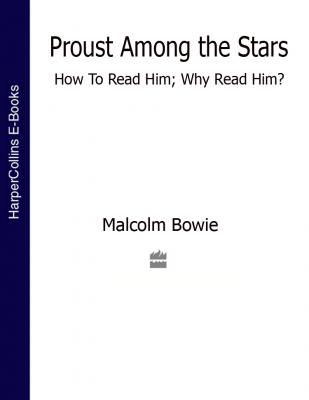Proust Among the Stars: How To Read Him; Why Read Him?. Malcolm Bowie
Читать онлайн.| Название | Proust Among the Stars: How To Read Him; Why Read Him? |
|---|---|
| Автор произведения | Malcolm Bowie |
| Жанр | Критика |
| Серия | |
| Издательство | Критика |
| Год выпуска | 0 |
| isbn | 9780008193324 |
William Collins
An imprint of HarperCollinsPublishers,
1 London Bridge Street
London SE1 9GF
First published in Great Britain by HarperCollinsPublishers 1998
Copyright © Malcolm Bowie
Malcolm Bowie asserts the moral right to be identified as the author of this work
A catalogue record for this book is available from the British Library
All rights reserved under International and Pan-American Copyright Conventions. By payment of the required fees, you have been granted the nonexclusive, nontransferable right to access and read the text of this e-book on-screen. No part of this text may be reproduced, transmitted, downloaded, decompiled, reverse-engineered, or stored in or introduced into any information storage and retrieval system, in any form or by any means, whether electronic or mechanical, now known or hereafter invented, without the express written permission of HarperCollins e-books.
HarperCollinsPublishers has made every reasonable effort to ensure that any picture content and written content in this ebook has been included or removed in accordance with the contractual and technological constraints in operation at the time of publication.
Source ISBN: 9780006863557
Ebook Edition © JUNE 2016 ISBN: 9780008193324
Version: 2016-06-06
More from the reviews
‘The great strength of the book lies in the way Professor Bowie traces the alternating rhythms of Proust’s sensibility in the looping movement of his complex sentences and of his meandering narrative … The overriding subject of Proust Among the Stars and its major contribution to Proust studies is a rhythm that lies both in “the periodic concentration and dispersal of the narrator’s sense of selfhood” and in the “alternating copiousness and restraint” of the novel’s deployment of language. Bowie’s discussions of the foldings and unfoldings in Proust’s sentences and in his convoluted storyline contribute to the sustained demonstration that Proust’s novel breathes, that it develops the sensible pulse of a living thing. A responsive reader soon begins to sense the alternating rhythms that propel the novel: solitude and society, elation and despair, plenitude and nothingness. Bowie encourages us to hear these vital rhythms in every aspect of Proust’s work … Like Baudelaire, Proust found a way which to describe the vast arena in which life, both individual and general, enacts its elaborate dance, alternating ceaselessly between sturdiness and precariousness. We all inhabit that arena. Yet without literary works as revealing as these, we barely recognise it.’
ROGER SHATTUCK, TLS
‘Very refreshing … read this splendidly tough-minded and generous introduction’
GABRIEL JOSIPOVICI, Independent
‘Just, discriminating, deft and learned.’
ROBIN PURVES, Glasgow Herald
‘Ripplingly intricate … Bowie is as at home with the intellectually complex (he has written on Mallarmé and the Art of Being Difficult), as with the indomitably tortuous (a surprisingly agreeable primer on Lacan), acutely shading in with expert deftness the cross-hatchings of feelings and commitment within A la recherche.’
ERIC GRIFFITHS, Evening Standard
‘Clear and inventively analytical’
ROBERT NYE, Scotsman
‘Subtle and beautiful’
PETER CONRAD, Observer
‘The love and knowledge Malcolm Bowie demonstrates in Proust Among the Stars makes this the book for existing and would-be buffs’
LISA APPIGNANESI, Independent, Books of the Year
‘A trenchant, affectionate and beautifully written study.’
EUAN CAMERON, Tablet
‘There are plenty of quotations from Proust in Bowie’s book; none, though, have drifted free from its moorings; all beat us back ceaselessly to what he calls that “three thousand page incantation, an insolently protracted exercise in word-magic”. Proust is worth it. Bowie’s book helps explain why.’
STUART JEFFRIES, Guardian
‘A searching attempt to grasp the nature of Proust’s vast project [written with] sheer passionate thoughtfulness. Bowie gives brilliant analyses of Proust’s long sentences, showing how the wavering movement of feeling in them can actually lift the reader up into an experience like the uneasy rise and culmination – or the frustration – of physical desire … The final chapter draws Bowie’s argument together through a reflection on the scene where Marcel and Albertine lie together at night on Balbec beach. This is where we find Proust “among the stars”. At one moment “the stars are a pure scattering of luminous points, and turn the narrator into a scatterbrain”. This images the book’s variety and richness. The next minute the stars have become constellations – symbols of the book’s colossal architecture. Bowie proceeds from here to a final, fascinating consideration of all the other meanings of ‘stars’ in Ala recherche. I think he gets three or four stars himself for this fresh and ardent book.’
DERWENT MAY, The Times
Sind wir nicht auch ein Weltgebaude, so gut als der Sternenhimmel, und eines das wir besser kennen solten, und besser kennen könnten, sollte man denken, als das dort oben?
GEORG CHRISTOPH LICHTENBERG, Gedankenbücher
Are we too not a cosmic system, and one we know better, or at least ought to know better, than we do the heavenly firmament?
Notebooks
It would indeed give me a certain household joy to quit this lofty seeking, this spiritual astronomy, or search of stars, and come down to warm sympathies with you; but then I know well I shall mourn always the vanishing of my mighty gods.
RALPH WALDO EMERSON, ‘Friendship’
LET THE MILKY WAY BE SPLIT INTO THE MILKY WAY OF INVENTOR/EXPLORERS AND THE MILKY WAY OF INVESTOR/EXPLOITERS
VELIMIR KHLEBNIKOV, The Trumpet of the Martians
CONTENTS
